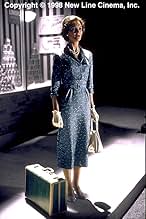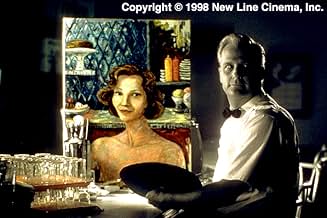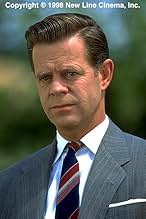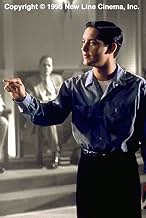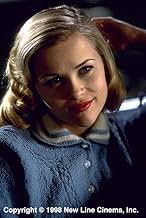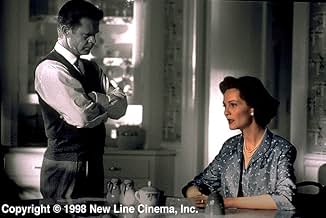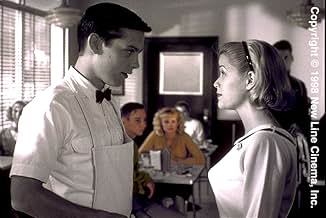Dos hermanos adolescentes de los años 90 se encuentran en una comedia de los años 50, donde su influencia empieza a cambiar profundamente ese mundo complaciente.Dos hermanos adolescentes de los años 90 se encuentran en una comedia de los años 50, donde su influencia empieza a cambiar profundamente ese mundo complaciente.Dos hermanos adolescentes de los años 90 se encuentran en una comedia de los años 50, donde su influencia empieza a cambiar profundamente ese mundo complaciente.
- Nominado para 3 premios Óscar
- 18 premios y 45 nominaciones en total
Argumento
¿Sabías que...?
- CuriosidadesAt one point, when Jennifer tries to use a bathroom there aren't any toilets. This is a clever reference to an FCC ruling during the 1950's, which stated that toilets (or any reference to their use, such as the sound of flushing) could not be presented on television. While this continued on broadcast television well in to the late seventies, the barrier in movies fell in 1960 (two years after the Pleasantville scenario) when Alfred Hitchcock persuaded the film censors to allow the flushing of a toilet in Psicosis (1960) because it was integral to the iconic shower scene.
- PifiasVarious inconsistencies and plot holes (stopped clocks, phantom opposing basketball teams) with the real world are consistent with Pleasantville being a TV world, and hence consistent with the movie.
- Créditos adicionalesThe New Line logo plays in complete silence.
- ConexionesFeatured in Fiona Apple: Across the Universe (1998)
- Banda sonoraAcross the Universe
Written by John Lennon and Paul McCartney
Performed by Fiona Apple
Produced by Jon Brion
Courtesy of Clean Slate/The WORK Group
Reseña destacada
Some critics here are saying the movie takes itself too seriously - but I believe some people are taking it too literally. ... Saying that the topics that are addressed have no impact on society anymore, clearly misses the point. ... The 50s -- or more specifically, 50s TV -- is used as a metaphor, because of the way 50s TV portrayed life in America. ... Thematically, this movie is about "Living Life" to the fullest, whatever that means. More specifically, to live life to the fullest -- to truly feel "alive" -- you need to take the good with the bad. Sweeping things under the rug and just acting "pleasant" all the time, is no way to live. That's what Tobey McGuire's speech at the end to his "real" mother is all about. Bad things happen, it's part of life. Having passion brings with it positives and negatives -- but suppressing true feelings for the sake of "pleasantness" is an empty life. THAT is the key ... and that "issue" is everlasting to the human condition.
Another point: People fear change. This is universal from the start of time until the end of time. The film suggests that changing and growing as a society and as people -- even if scary -- is good. Just because the 50s were used as a metaphor for that, don't believe for a minute this isn't a universal issue that exists today and forever.
Another issue common for people critical of this film is the sexual issue. They say that Gary Ross is promoting sexual promiscuity, sex out of wedlock, etc... Again, I believe it misses the point. Is Ross suggesting that premarital sex is OK? Yes, and I'd agree - and I'm sure there's plenty of people who don't agree with that, and that's OK too. But, again, the sex is just part of the theme - used as a high-profile example to making the overall point about "openness" - and not suppressing one's feelings. Note that the Reese Witherspoon character was already promiscuous, and her transformation was actually something completely different.
I can't make everyone like this film - I'll just say that, on a personal note, I was so floored by this film, I had to see it again the next day. That had never happened to me before, or since. Ross' commentary goes on to speak of everything I felt about the film when I first saw it. It was great to hear that his reasons for what he did, meshed exactly with how I took it. I had to write him a letter to tell him so - another thing I'd never done before or since.
This is not a perfect film. I liked its subtlety, but then the racism correlation, and the censorship stuff, got a bit more overt. The courtroom scene at the end is a bit cliche ... and I also agree with one poster who said that, to make the point about taking the good with the bad, we should've seen a bit more about the consequences of their actions.
Those are merely nitpicks in the grand scheme of things. This is a 10 out of 10.
Another point: People fear change. This is universal from the start of time until the end of time. The film suggests that changing and growing as a society and as people -- even if scary -- is good. Just because the 50s were used as a metaphor for that, don't believe for a minute this isn't a universal issue that exists today and forever.
Another issue common for people critical of this film is the sexual issue. They say that Gary Ross is promoting sexual promiscuity, sex out of wedlock, etc... Again, I believe it misses the point. Is Ross suggesting that premarital sex is OK? Yes, and I'd agree - and I'm sure there's plenty of people who don't agree with that, and that's OK too. But, again, the sex is just part of the theme - used as a high-profile example to making the overall point about "openness" - and not suppressing one's feelings. Note that the Reese Witherspoon character was already promiscuous, and her transformation was actually something completely different.
I can't make everyone like this film - I'll just say that, on a personal note, I was so floored by this film, I had to see it again the next day. That had never happened to me before, or since. Ross' commentary goes on to speak of everything I felt about the film when I first saw it. It was great to hear that his reasons for what he did, meshed exactly with how I took it. I had to write him a letter to tell him so - another thing I'd never done before or since.
This is not a perfect film. I liked its subtlety, but then the racism correlation, and the censorship stuff, got a bit more overt. The courtroom scene at the end is a bit cliche ... and I also agree with one poster who said that, to make the point about taking the good with the bad, we should've seen a bit more about the consequences of their actions.
Those are merely nitpicks in the grand scheme of things. This is a 10 out of 10.
- adamw_13
- 15 feb 2003
- Enlace permanente
Selecciones populares
Inicia sesión para calificar y añadir a tu lista para recibir recomendaciones personalizadas
Detalles
- Fecha de lanzamiento
- País de origen
- Idioma
- Títulos en diferentes países
- Amor a colores
- Localizaciones del rodaje
- Petaluma, California, Estados Unidos(Scenes filmed at Petaluma Blvd and Western Ave.)
- Empresas productoras
- Ver más compañías en los créditos en IMDbPro
Taquilla
- Presupuesto
- 60.000.000 US$ (estimación)
- Recaudación en Estados Unidos y Canadá
- 40.584.421 US$
- Fin de semana de estreno en EE. UU. y Canadá
- 8.855.063 US$
- 25 oct 1998
- Recaudación en todo el mundo
- 49.805.462 US$
- Duración2 horas 4 minutos
- Color
- Mezcla de sonido
- Relación de aspecto
- 1.85 : 1
Contribuir a esta página
Sugerir un cambio o añadir el contenido que falta

Principal laguna de datos
By what name was Pleasantville (1998) officially released in India in Hindi?
Responde


